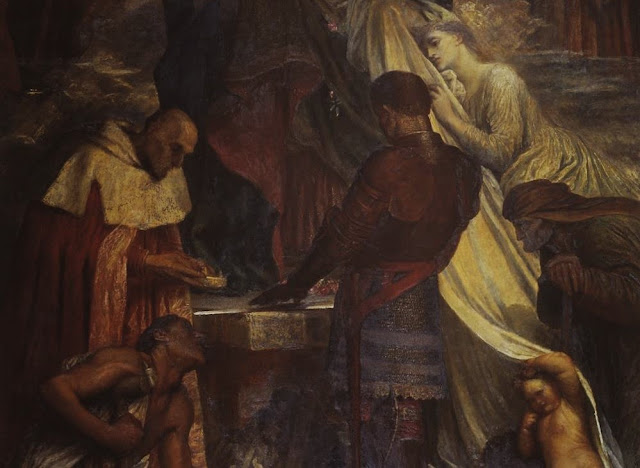What if—just by wishing—you could change the world?
What would you do?
In the last post, I explored the idea that wishes are what lay behind (and under and above) reality. It’s one thing to talk about wishes; it’s another thing to actually do something with those wishes. If we really do have the power to change the world through our wishes, how do we decide which wish is worth wishing?
 |
| Grograman by Brianne Lamanna |
I really appreciated the discussion of how difficult and dangerous wishing can be from The Neverending Story by Michael Ende. In this story, the boy Bastian receives the power to wish almost anything into existence, but he’s overwhelmed by—and uncertain about—the infinitude of decisions that lay before him. Here’s a bit of the dialogue between Bastian and the wise Grograman (the “Many Colored Death”):
[Grograman said,] “Without a genuine wish, you just have to wander around until you know what you really want…[In the end,] you must do what you really and truly want. And nothing is more difficult.”
“How can I find out?” [Bastian responded.]
“By going the way of your wishes, from one to another, from first to last. It will take you to what you really and truly want.”
“That doesn’t sound so hard,” said Bastian.
“It is the most dangerous of all journeys.”
“Why?” Bastian asked. “I’m not afraid.”
“That isn’t it,”Grograman rumbled. “It requires the greatest honesty and vigilance, because there’s no other journey on which it’s so easy to lose yourself forever.” (chapter 15)
The rest of the story follows Bastian as he finally finds what is worth wishing for. But, like Grograman says, the process of learning exactly what to wish for is a difficult, dangerous journey.
There have been countless stories of people who are suddenly given the infinite power of making their wishes come true immediately, and how such wishes can easily ruin lives. Among my favorites of these classic stories are “The Man Who Could Work Miracles” by H.G. Wells, “The Monkey’s Paw” by W.W. Jacobs (not to mention the Simpsons’ masterful adaptation), as well as the more contemporary Into the Woods (which I recently wrote about here). The moral of these stories is always: be careful what you wish for.
But what happens when people wish well?
In his short book As a Man Thinketh, James Allen captures this beautiful possibility:
The dreamers are the saviours of the world. As the visible world is sustained by the invisible, so men, through all their trials and sins and sordid vocations, are nourished by the beautiful visions of their solitary dreamers. Humanity cannot forget its dreamers; it cannot let their ideals fade and die; it lives in them; it knows them as the realities which it shall one day see and know.
Composer, sculptor, painter, poet, prophet, sage, these are the makers of the after-world, the architects of heaven. The world is beautiful because they have lived; without them, labouring humanity would perish. (“Visions and Ideals” in As a Man Thinketh)
I’m particularly fascinated by the idea that artists (of all sorts) are among the “architects of heaven.” For Allen, this present world—with all of its wish-driven potential—can become something of a heaven. Looking back on my own experiences with great works of art, I can see how these creations—these tangible wishes—have transformed the world into something heavenly.
A clear example of this is the Watts Mortuary Chapel in Surrey, England. Mary Watts (who married G.F. Watts, whose work I’ve written about here) brought together the people of Compton village to create, through art, a sort of heaven on earth—a building that became saturated with symbolism, both without and within.
 |
| Mary Watts and her students decorate interior panels for the chapel in her studio at Limnerslease. |
What is implicit in Allen’s statement is that each of these artists—these dreamers and wishers of goodness, truth, and beauty—seem to be engaged in a collaborative effort to shape this earthly heaven (this is another idea that has invaded my thoughts, which I hope to return to in the near future).
But lest we think that becoming an “architect of heaven” is limited to a few artistic geniuses, Allen goes on to encourage every living person to carefully cultivate their wishes and join this far-reaching architectural community:
Cherish your visions; cherish your ideals; cherish the music that stirs in your heart, the beauty that forms in your mind, the loveliness that drapes your purest thoughts, for out of them will grow all delightful conditions, all, heavenly environment; of these, if you but remain true to them, your world will at last be built.
Whenever we respond to the good, the true, and the beautiful produced by others, we are amplifying the power of their wishes. And every time we produce something that reflects these ideas—no matter how small or insignificant it may appear to be—we ourselves are in a very real way becoming “architects of heaven,” right here, right now.
































.jpg)